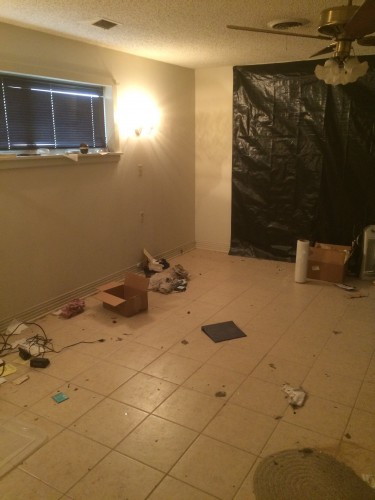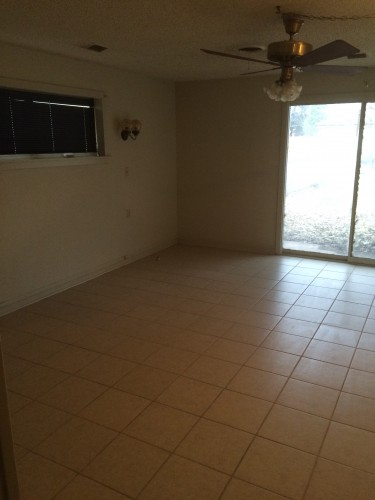
 Walking through an abandoned rent house and seeing the ruins of former tenants is an exercise in human connection—archaeology of life, or the privation of it. In nearly twenty years, I haven’t often found deep meaning in getting a house “rent ready,” but I find myself being taken in by the nihilistic futility of Rust Cohle as I traverse from one scene of archaeological ruin to the next. Nothing draws these connections as powerfully, though, as when the ruins are left in a tenant’s wake even though their earthly body still blocks the house’s front entrance. This just happened a few weeks ago.
Walking through an abandoned rent house and seeing the ruins of former tenants is an exercise in human connection—archaeology of life, or the privation of it. In nearly twenty years, I haven’t often found deep meaning in getting a house “rent ready,” but I find myself being taken in by the nihilistic futility of Rust Cohle as I traverse from one scene of archaeological ruin to the next. Nothing draws these connections as powerfully, though, as when the ruins are left in a tenant’s wake even though their earthly body still blocks the house’s front entrance. This just happened a few weeks ago.
Finding tenants dead in one of your rent houses is not something they teach in landlord school, but something that comes from the school of hard knocks. It’s happened to us, at least, two other times. My mother and father have always found the body first, and I’m the one who cleans up the place once the body is removed and any investigation is completed. I am the one who attempts to remove the guise of death, collecting mental artifacts and observations about the lives of those who once were.
The same question always comes to mind: what would my ruins say about me to a complete stranger?
This particular instance, though, felt more meaningful than the examples we have dealt with in the past. This man, late-forties, lived in this three-bedroom, two-bath rent house—a house I, too, once lived in—but the living room, back bedroom and sun room were never used. There was nothing in them but dust. A dust that constituted a metaphorical reminder that he, now, was once again returned to the dust of the sons and daughters of Adam. “Ash to ash, dust to dust” is the liturgy of human experience. His was no exception.
He lived sparsely. I think he lived on his recliner in front of the TV while his dog—which my parents have now taken in as their own—tore up his dog bed and various other things in the two other bedrooms. One bathroom was barely used; one was filled with paper rolls, urine-stained newspapers, and a focal point of the shit-smeared toilet that I had to clean. The kitchen was equally trashed with emptied, wet ice bags collected in the kitchen sink. I think he used it as his icebox, because all he had was a tiny beer fridge.
 If there was one thing that tied the décor of his digs together, it would be the spread of Southern Comfort, beer cans and wine boxes that inhabited every space he’d used. We are talking emptied cases of 100-proof Southern Comfort. Only one unfinished bottle. The cops had been there before when the guy’d had a stroke, so it’s possible he had another, or he finally placed the last bit of liquor to his lips and his body shut down. That is all speculation on my part, however. Just an amateur piecing together of the man’s life–as I clean and ready the house to be rented again–out of the human wreckage. The same vestiges of everyday life that bind us all.
If there was one thing that tied the décor of his digs together, it would be the spread of Southern Comfort, beer cans and wine boxes that inhabited every space he’d used. We are talking emptied cases of 100-proof Southern Comfort. Only one unfinished bottle. The cops had been there before when the guy’d had a stroke, so it’s possible he had another, or he finally placed the last bit of liquor to his lips and his body shut down. That is all speculation on my part, however. Just an amateur piecing together of the man’s life–as I clean and ready the house to be rented again–out of the human wreckage. The same vestiges of everyday life that bind us all.
Most of the ritual of tenant/landlord relations is fairly commonplace: exchanging rent, making repairs and maintaining a certain communication that aims for the best possible relations between the two. Landlords are the middlemen between the renters and the owners of the house. We act as the “priest”—the mouthpiece from the renter to the owner and vice versa. When tenants move out we perform the cleansing of the property so that another people can inhabit a shelter, a home, a temporal promised land of sorts that my family and I lead them into.
Not to sell myself, or others in the family business, as people more important than we are, but there is a certain priestly duty to our work in these circumstances. There is a cleansing going on here, not just in the cleaning up of the house, but, to some extent, in the cleaning up of the man’s failures, vices, worries and such. When I finished the house and we put it back on the market, his presence was all but removed: Southern Comfort no longer flowed down the corridors, the toilet was renewed to its former blush-pink color, and the smell of death was neutralized. I am one of only a select few who hold this man’s presence in my being, because I heard his posthumous confessions. His burdens lay heavy in the air during that week and a half I was there.
And, in a way, his life was cleansed, and all, except those who physically knew him or, like me, lived in his ruins, forgot his vices. As I wiped away his transgressions, I was able to, like the priests of a more ancient time, bestow on him a type of forgiveness. And now a new family lives in that house. New life inhabits a place that has known death and the darkness of human nature.
As I worked on that house, I found myself praying for the man. Short prayers that spoke specifically to those parts of his life I was able to piece together; parts that may not have been known fully by anyone else. I prayed that the heavenly work of redemption and restoration would be done as it was currently being done on earth. Praying for a complete stranger is rather new to me as a believer. I mean, we pray for the persecuted church and those affected by massive tragedies, but, specifically, praying for an individual person whom I never knew and only saw the remnants of…. Death drew me into the messiness of his life.
 I went further, and, as I wiped the sticky, sweet remains of liquor off the kitchen countertop, I wondered what my remains would tell complete strangers who may find themselves in direct contact with them. Maybe my Facebook and twitter logs will testify to my pettiness and false personas, or maybe the amounts and types of entertainment I purchase online will show a disconnect between my public ideologies and hidden practices. I think these ruins of a lived life are probably going to speak more to the vices, the regrets, the memories of failed opportunities to love, to laugh, to restore what was broken. I think that is the wreckage left here on earth because, on some level, they belong here. They belong here, because when the Savior comes and the new heavens and new earth come, they are exactly the remnants that need to be renewed, transformed and given back to those who live on in the life everlasting as reminders, sacred scars, of a past life in a wrecked world…
I went further, and, as I wiped the sticky, sweet remains of liquor off the kitchen countertop, I wondered what my remains would tell complete strangers who may find themselves in direct contact with them. Maybe my Facebook and twitter logs will testify to my pettiness and false personas, or maybe the amounts and types of entertainment I purchase online will show a disconnect between my public ideologies and hidden practices. I think these ruins of a lived life are probably going to speak more to the vices, the regrets, the memories of failed opportunities to love, to laugh, to restore what was broken. I think that is the wreckage left here on earth because, on some level, they belong here. They belong here, because when the Savior comes and the new heavens and new earth come, they are exactly the remnants that need to be renewed, transformed and given back to those who live on in the life everlasting as reminders, sacred scars, of a past life in a wrecked world…
…which ultimately makes the new reality of life in the eschaton that much sweeter and glorious. The archaeological ruins of life are a reminder of mortality, but they embody the tainted glory of who we were meant to be.
None of us know when our last breath will be had. We know in the back of our mind that the end is inevitable, but when death seizes someone—whether close to us or not—there is a certain jarring realization that we need the grace and forgiveness of a Savior now rather than later. Because, when the jig is up and the Man comes around, our wreckage will be seen for what it is and renewed in gloriousness.

COMMENTS
10 responses to “Of Death & Southern Comfort: The Making of an Everyday Priest”
Leave a Reply













Great post, Blake! So good.
“when the jig is up and the Man comes around, our wreckage will be seen for what it is and renewed in gloriousness.”
Thanks so much, Jim!
Friggin’ extraordinary, Blake!
Thanks, Ian. AND thanks for taking a look at it for me!
Really special.
Thanks so much, DBab! Glad it moved you. 🙂
Thanks for posting Blake’s posting, Jim. Really spoke to my heart and reminiscent of when we had to clean out my children’s father’s condo after he died, A warning to all of us to be diligent in all our dealings in all we say, do & think.
Thanks for reading, Naomi! It is a warning, but, also, a salve in the midst of our imperfection. We are unable to wipe away the remains of our own sins completely. We look to the grace of God–the cross of Christ–to accomplish exactly that! Glad you found this piece moving! 🙂
Great stuff, Blake. Being in real estate I have had similar experiences. I’ve never came across a body but when the bank would send you over to appraise the latest foreclosure . . . . Those empty homes tell a story and you can see and literally feel the loss, shame, guilt, anger and sadness in the walls and on the floors. Like you, I found myself praying for these unknown people as well.
Thanks so much for that, Brian! Yeah, I would imagine you have come across your own spread of human artifacts in the work you do. Makes me reflect on the old saying: if these walls could talk…